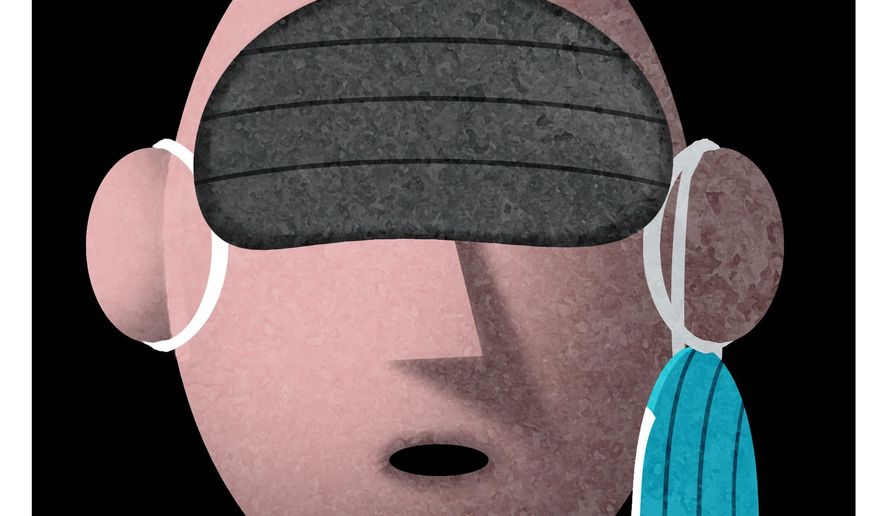OPINION:
This past week, on Labor Day, to be exact, I submitted my routine column to The Washington Times. The topic I chose was frankly quite simple and straightforward; many might rightly suggest it was even boring and mundane. My subject matter was disease immunity, something many of us kind of slept through in our freshman Biology 101 classes.
In my article, I spoke of how medical science has known for centuries that natural immunity derived from pathogenic exposure is critical to disease mitigation and control.
I wrote about how doctors have understood since at least the early 1800s that when you contract a virus and fight it off, your immune system encodes that information in a way that builds immunity to the consequent sickness.
I talked of the reality of mass exposure, otherwise known as “herd immunity,” and how it is actually a good thing because when it is reached, pandemics, by definition, downgrade to epidemics and therefore become manageable.
I reminded all that we live in a broken world and that viruses and diseases such as COVID-19, smallpox and the Spanish flu have vexed the human race since the dawn of time.
I then suggested that we dare not hide in a cave out of fear of such realities but that we should deal with today’s crisis in the same way as we have all others before it and accept the fact that life isn’t safe and that the mere act of getting out of bed each morning is fraught with risk.
I ended by arguing that Americans are a people who cherish freedom as a top priority — a “First Thing” — over and above government-enforced “safety” and Big Brother’s collective care.
As I say, my column was essentially not the stuff that heretofore the past 20 months would have been considered the most inspiring.
The result?
Despite what I considered pallid content, my article immediately jumped to “trending” status on several news sources such as The Hill, Facebook, Apple News and the like. In fact, it was number three (I think) when I first saw it on one of my news feeds.
But then something peculiar happened. The article just inexplicably disappeared from all the trending lists. It didn’t gradually lose traction. It was just gone. It was featured one second, but then it literally just disappeared. A mere mist. Dust in the wind. Popular and trending one minute and nonexistent the next.
I was confused, so I contacted The Washington Times to let them know all the above. Their response? “You’ve been shadow-banned. Every article we’ve published on natural immunity has received the same.”
If this doesn’t frighten you, your mind is addled and dull. I don’t care if you’re conservative or progressive, a constitutionalist, a libertarian, an independent or an apolitical pragmatist, this story should worry you more than all the COVID-19 articles you’ve read combined.
They (whoever “they” are) decide what you can read and what you cannot. “They” are controlling the information and the news. “They” determine what articles will “trend” and what articles will be trashed. “They” are in charge. “They” manage the ideas. “They” will not permit anyone to read anything of which they disapprove. “They” are watching you. “They” are censoring you. “They” are silencing you. “They” are canceling you. “They” won’t even let you write something about the scientific facts of natural immunity. Say something “They” don’t like and you, my friend, are verboten.
Let that sink in for a minute or two. Sift it around a bit. Consider its import before you simply move on to the next mind-numbing blurb on your smartphone.
In his book, “Selling Hitler: Propaganda and the Nazi Brand,” Nicholas O’Shaughnessy argues that the success of Nazi ideology can only be understood via the role of propaganda in the Third Reich. The Nazis, he says, understood the modern techniques of opinion-formation. Joseph Goebbels, who was appointed to be the Minister of Propaganda and Public Enlightenment of Nazi Germany, once declared: “There are two ways to [control people]. You can blast your enemy with machine guns until he acknowledges the superiority of those holding the [weapons]. That is one way. Or you can transform the nation through a revolution of the spirit [i.e., the mind].” In other words, you can control people with bullets and bombs, but you can do so even more effectively by manipulating the news they hear and the books they read. Hitler’s chief architect, Albert Speer, admitted as much when he told the Nuremberg Tribunal “what distinguished the Third Reich from all previous dictatorships was its use of all the means of communication to sustain itself and to deprive its objects of the power of independent thought.”
George Santayana once said, “Those who do not remember the past are condemned to repeat it.” We’d all do well to pay attention.
• Everett Piper (dreverettpiper.com, @dreverettpiper), a columnist for The Washington Times, is a former university president and radio host. He is the author of “Not a Daycare: The Devastating Consequences of Abandoning Truth” (Regnery) and, most recently, “Grow Up: Life Isn’t Safe, But It’s Good.”




Please read our comment policy before commenting.